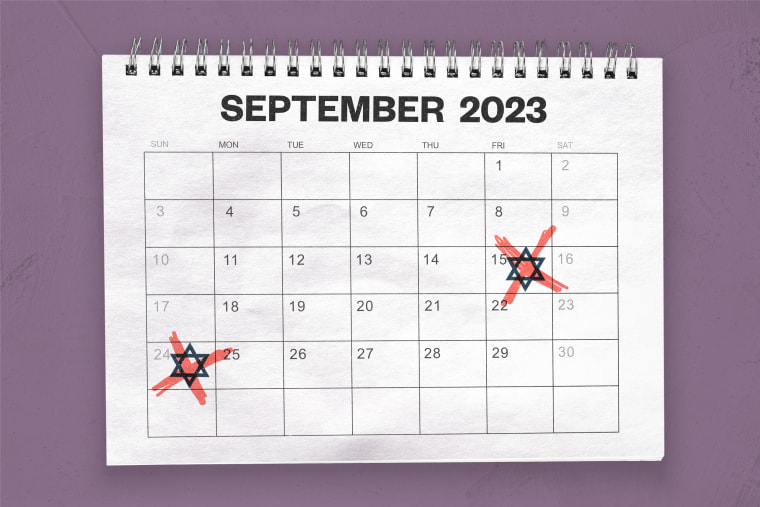A school board in Farmington, Connecticut is reversing its controversial decision to “delete” Rosh Hashanah and Yom Kippur, the Jewish faith’s holiest holidays, as days off on the schools' academic calendar.
The move comes after protest from the community and weeks of criticism that drew a spotlight to the district.
Laura Shaw Frank, who serves as a director at the American Jewish Committee (AJC), a non-profit Jewish advocacy group, says she is concerned that schools getting rid of Jewish holidays could become a trend amid a broader wave of antisemitism.
“By removing holidays, it sends a message to Jews that we are not cognizant of your concerns, and we are not worried about your comfort in a moment where Jews are already feeling marginalized,” she tells TODAY.com. “These schools are making a statement to the community.”
Last year was the highest year on record for reports of violence and vandalism against Jews, according to the Anti-Defamation League.
“The pandemic put kids way behind. There is certainly reasoning for having as much in-person instruction as possible, and I get that,” Shaw Frank says. “But we are in a moment where Jews in America are feeling particularly fragile. There has been a lot of very public antisemitism in the last few years.”
In November, a school board in Falls Church, Virginia, announced they will no longer close for the Jewish holidays of Rosh Hashanah and Yom Kippur, Diwali, and the Muslim holiday of Eid Al-Fitr.
The city council in Lewiston, Maine, dropped Rosh Hashanah and Yom Kippur from the calendar in 2021, pointing to the small number of students and faculty who celebrate.
In Farmington, the school board also came under fire for refusing to add a day off for Diwali, despite a growing South Asian American student population.
At the same time, the school board voted to retain Indigenous Peoples’ Day and Good Friday.
In a statement on Dec. 5, board chair Liz Fitzsimmons explained the board’s vote to "delete" the holidays from the calendar was “based on operational and educational factors” and “was not discriminatory or antisemitic in any way.”
Eveline Shekhman, who is Jewish and has children in Farmington public schools, tells TODAY.com that it was “hard to ignore the timing.”
According to the Anti-Defamation League, a non-profit organization that tracks hate crimes, 2021 was the highest year on record for documented reports of assault, harassment and vandalism directed against Jews. Attacks against synagogues and Jewish community centers were up by 61%, the ADL reports.
“Antisemitism is on the rise, and suddenly we were going backwards,” Shekhman says, noting that Jewish holidays have been on Farmington’s school calendar since 1999.
“I’m glad we’re back to status quo,” she says. “I’m glad that they heard us — but this should not have been an issue.”
“Now they need to go back and look at the calendar to figure out how they can work with Diwali,” Shekhman adds.
Across the country, diversity, equity, and inclusion (DEI) coordinators who work at schools often don't include Jews in their framework, Shaw Frank says.
"The response is, 'Jews are white and Jews are privileged,'" Shaw Frank says. "But hatred and discrimination against Jews has never been obviated by privileged economic status or white skin."
David Waren, who is the president of the Jewish Federation of Greater Hartford, says he believes the Farmington school board’s initial decision wasn’t motivated by antisemitism.
“They just didn’t have the right information,” Waren tells TODAY.com. “They can’t ask teachers and students what their religion is — and they made a decision without having the data of what the implication would be.”
Waren says he appreciates that the board "had the courage to look at the issues again," and to "create policies that are inclusive."
"Their (previous) decision came in the context of rising antisemitism, rising bigotry and rising polarization,” he continues. “And there’s a great deal of insecurity in our community right now.”
Waren says Farmington residents will continue advocating for schools to have a day off for Diwali.
“It’s so important today to elevate that value of inclusivity and respect for diversity,” he says. “We’re committed to ensuring that their holiday observance is placed on the calendar as well.”
Related video:
